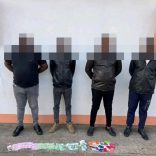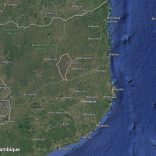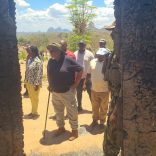Gang of four arrested in Maputo over debit card theft
Mozambique: INAE dismantles clandestine shoe factory in Maputo city – O País

Photo: O País
The National Inspection of Economic Activities (INAE) on Monday closed an unregulated shoe factory in Maputo owned by Chinese citizens.
From the outside, no one would guess that one of the buildings overlooking the EN4 in Maputo’s B Luís Cabral neighbourhood housed a sophisticated factory dedicated to the clandestine manufacture of footwear.
The place does not have any documentation allowing it to produce shoes, nor licence to produce the brands of sports sneakers it manufactured.
A notice on site indicates that taking photographs is prohibited, and that surveillance cameras are installed everywhere.
The machines used are of the latest generation, and production is computerised.
The National Director of Operations at INAE, Leonor Mabutrana, who led the team of inspectors working on the case, spoke to journalists about the process.
“This is, for all intents and purposes, criminal activity, because it involves counterfeiting and illicit use of an unauthorised brand. This factory does not have authorization to produce or assemble these shoes with these brands, namely Adidas, Nike and Tommy Hilfiger. And, in addition to not having authorization, the factory does not have documentation granting permission to produce footwear. So, we are faced with two types of contraventions: the lack of legality for the exercise of economic activity that has to do with the production of footwear, and the counterfeiting and illicit use of brands, which, whether under the terms of the Industrial Property Code or the Penal Code, are counterfeiting crimes.”
Since the 13th of this month, when the factory was shut down, more than 30,000 pairs of counterfeit shoes have been counted at the decommissioned site.
Around 50 workers are employed at the factory, with the employer making it difficult to obtain more information.
The INAE reports that, to find the factory, it had to intercept a containerized truck, transporting and distributing suspicious products. Interaction with the driver led the inspectors and the police to the location in Luís Cabral.
“It is known in advance that this is a crime of counterfeiting and illicit use of the brand, which has its administrative measures provided for in the Industrial Property Code, as well as in the Penal Code. This process will continue until we reach the necessary conclusions. For now, we are counting the shoes and seizing them, using the warehouse for storage, and then continuing the clarification process,” the INEA report concludes.
Downtown Maputo had long been flooded with pirated footwear, but it was not thought that these were actually manufactured in the country’s capital.












Leave a Reply
Be the First to Comment!
You must be logged in to post a comment.
You must be logged in to post a comment.